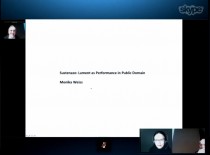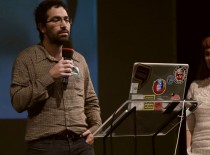Prague - December 7, 2012
Mirko Tobias Schäfer presents his paper within the panel Limits of Collaboration: The Revolution of the Geniuses or the Downfall in Middlingness at International conference Mutamorphosis in Prague, Czech Republic.
In April 2009, Mark Zuckerberg, the CEO of Facebook addressed his users in a video posted to the ‘Facebook Governance Site’ [sic]. In a presidential pose the young entrepreneur calls the close to 500 million users to participate in a voting ‘on the documents that should govern Facebook’. As many other social media platforms, the social networking site attempts to establish new forms of interacting with its large numbers of users. The vast plurality of users participating daily on platforms such as Twitter, Facebook, YouTube, Pinterest and others already indicates their importance in communication and social interaction of western societies. These corporately owned web-applications have turned into platforms where increasingly activities unfold that we have conducted traditionally in public space: debates, conversations, raising attention for socio-political issues, sharing of cultural commons etc. However, the main objective for the platform providers is monetizing user activities. In order to keep their platforms attractive for broad audiences and advertisers, they carefully channel what users do. Monitoring of user content, design features for stimulating certain activities and avert others and the enforcement of the corporate rules characterize the creation of what we euphemistically call user-generated-content. This content, however, is always subject to the terms of use imposed by the platform provider.
In a way ‘social media’ platforms constitute public spaces, however corporately owned. Users sometimes like to question the terms of use and power structures on private platforms, that increasingly have also a public quality.
Since a large and dynamic user base is vital for their commercial success it is not surprising that these platforms are experimenting with forms of governance. This paper describes how commercial and non-profit web platform providers organise interaction with their users, regulate user activities and formalize policies in software design in order to facilitate social interaction and cultural production. Referring to extensive case studies on Facebook, I show how the rhetoric of participation is used to establish the Mark Zuckerberg as legitimate governor of Facebook and to present it’s terms of use as result of a collective decision making process. In consequence my paper revisits the overly enthusiastic framing of participation.
- Tags:




 Copyright © 2025 ARTISTTALK. All Rights Reserved.
Copyright © 2025 ARTISTTALK. All Rights Reserved.
0 Comments
You can be the first one to leave a comment.